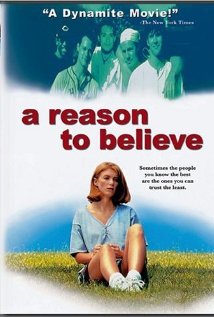 Throughout the late 90s, a rather obscure film from 1995 called A Reason To Believe used to show up on Cinemax fairly frequently. I was 11 when I first saw it. At the time, I was indulging in my rebellious streak by secretly staying up past my bed time and sneaking into the living room, where I would watch whatever forbidden sordidness what being aired. Because I didn’t want to wake anyone up, I would watch with the volume turned almost all the way down. Hence, when I first saw A Reason To Believe, I literally had to sit less than an inch away from the TV just so I could hear the dialogue.
Throughout the late 90s, a rather obscure film from 1995 called A Reason To Believe used to show up on Cinemax fairly frequently. I was 11 when I first saw it. At the time, I was indulging in my rebellious streak by secretly staying up past my bed time and sneaking into the living room, where I would watch whatever forbidden sordidness what being aired. Because I didn’t want to wake anyone up, I would watch with the volume turned almost all the way down. Hence, when I first saw A Reason To Believe, I literally had to sit less than an inch away from the TV just so I could hear the dialogue.
And I remember that, at the age of 11, A Reason To Believe really blew me away. I thought it was one of the greatest films that I had ever seen. The fact that the film involved college students made me feel like I was both watching a movie for adults and getting a preview of what life would be like when I was older. All of the sex and the language made me feel like I was getting away with something while I was watching it. At one point, there was a shot of Sharon (played by Holly Marie Combs) putting a condom on Wesley’s (Danny Quinn) erect penis and I found myself glancing over my shoulder, convinced that at any minute a responsible adult was going to enter the living room and say, “WHAT ARE YOU WATCHING!?”
So, when I recently rewatched A Reason To Believe, I did so wondering how the film would hold up now that I’m an adult. Not surprisingly, a good deal of the film now seemed to be heavy-handed. For every good line in the script, there was a line that was way too obvious. Characters who were funny when I was 11 — like dorky stoner Potto (Keith Coogan) — now seemed to be annoying. And, of course, my more experienced eyes immediately realized that Holly Marie Combs was putting that condom on a prosthetic penis.
And yet, A Reason To Believe is still fairly effective and probably deserves to be better known than it actually is. Usually, I refuse to give extra credit for good intentions but I’m willing to make an exception for A Reason To Believe because the film deals with a subject that, now more than ever, needs to be dealt with.
Charlotte (Allison Smith) is a student at an unnamed generic university. When her boyfriend, Wesley (Danny Quinn), has to go away for the weekend, he asks Allison not to go to Viking, an annual party thrown by his fraternity. Charlotte promises that she won’t but then goes anyway. At Viking, she hangs out with Wesley’s best friend, Jim (Jay Underwood). Jim is also dating Allison’s friend, Judith (Kim Walker). Realizing that she’s had too much to drink, Allison attempts to leave the party but instead, Jim leads her into his bedrom. He kisses her. She says no but Jim forces himself on her. Repeating all the old bullshit excuses (i.e., Charlotte was flirting with him, all girls say no when they mean yes, and all the rest) Jim seems to truly believe that the sex was consensual. Charlotte knows it was rape.
At first, Charlotte doesn’t want to face what happened. When she finally does go to the university administration and reports what happened, the frat — including her boyfriend — comes together to protect Jim. Charlotte’s friends — like Judith — abandon her. Her only supporter is Linda (Georgia Emelin), an anti-fraternity campus activist who is more interested in Charlotte as a means to an end than as a human being.
A Reason To Believe held up fairly well. Yes, it’s heavy-handed and a lot of the dialogue is too spot-on and literal. I could have done without the scenes featuring Obba Babatunde as a bombastic professor. However, Allison Smith and Jay Underwood both gave excellent performances in the two lead roles and the film deserves a lot of credit for not shying away from just how misogynistic the fraternity/sorority culture can truly be. Ultimately, flaws and all, it’s a valuable, realistic, and angry portrayal of rape culture and it deserves to be seen for that reason.
It can currently be viewed on YouTube.
